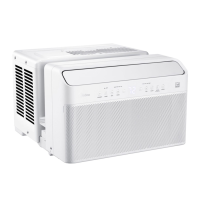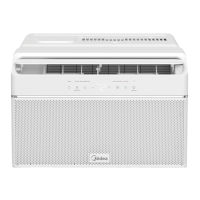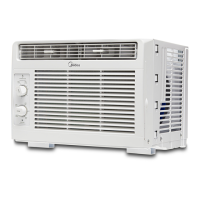34
TROUBLESHOOTING TIPS
Problem Solution
Air conditioner does not start.
Wall plug disconnected. Push plug rmly into wall outlet.
Circuit breaker tripped. Reset circuit breaker.
Check if the light on the plug is on. If it is off, press the RESET button.
Power is OFF. Turn power ON.
Unit turned off and then on quickly. Turn unit off and wait 3 minutes
before restarting.
Air from unit does not feel cold
enough.
Room temperature below 62°F (17°C). Cooling may not occur until room
temperature rises above 62°F (17°C).
Temperature sensor behind the air lter is touching the cold coil. Try to
move it so it does not contact the cold coil.
Reset to a lower temperature.
Compressor shut-off by changing modes. Wait approximately 3 minutes
and listen for compressor to restart when set in the COOL mode.
Check for potential obstructions blocking the outdoor intake/exhaust.
Clear any obstructions.
Air conditioner cooling, but room
is too warm - ice forming on
cooling coil behind air lter.
Outdoor temperature below 64°F (18°C). To defrost the coil, set to FAN
ONLY mode.
Air lter may be dirty. Clean lter. Refer to Cleaning and Maintenance
section. To defrost, set to FAN ONLY mode.
Thermostat set too cold for night-time cooling. To defrost the coil, set to
FAN ONLY mode. Then, set temperature to a higher setting.
Air conditioner cooling, but room
is too warm - NO ice forming on
cooling coil behind air lter.
Dirty or restricted air lter. Clean lter. Refer to Cleaning and Maintenance
section. To defrost, set to FAN ONLY mode.
Temperature is set too high, set temperature to a lower setting.
Air directional louvers positioned improperly. Position louvers for better
air distribution.
Front of unit is blocked by drapes, blinds, furniture, etc. - restricts air
distribution. Clear obstruction in front of unit.
Any open doors, windows, or registers may allow cold air to escape. Close
any doors, windows, or registers.
The room may be too warm. Allow additional time to remove “stored
heat” from walls, ceiling, oor and furniture.
Before calling for service, review this list. It may save you time and expense. This list includes common
occurrences that are not the result of defective workmanship or materials in this appliance.

